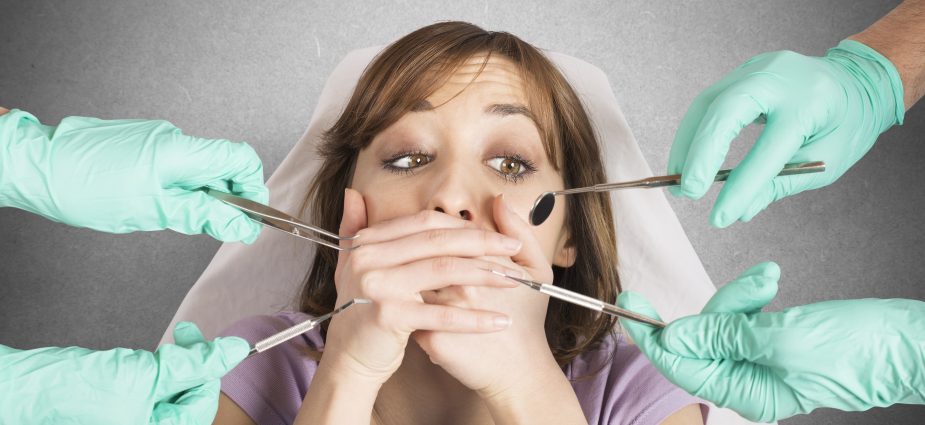
Do you suffer from fear or anxiety when it comes to visiting the dentist? If you do, you are not alone. In fact, studies show that approximately 30 to 40 million Americans avoid seeing the dentist because of anxiety or fear. Something interesting, however, was discovered when the general public was asked the question, “What would help ease the fear or anxiety?”
The response was nearly unanimous. Patients are looking for consistently pleasant, enjoyable, and painless dental visits to deem their fear and anxiety ‘a thing of the past.’
At Rockefeller Cosmetic Dentistry, we took these findings to heart and decided to center our practice’s mission around our desire to end dental anxiety. We pride ourselves on providing our patients with consistency in our professional, pleasant, painless, and effective dental services. Our patients come first, and because of this, their comfort and peace of mind during a visit is our main priority. In addition, we offer technical solutions to help our patients to relax during a procedure without experiencing any pain. Read below for more information and helpful tips for dealing with your dental fears.
What Is Dental Anxiety?
Dental anxiety is a very common condition, however, there are several ways to help manage it. Patients with dental anxiety often experience a sense of uneasiness when it comes to visiting the dentist. It can be correlated with certain triggers such as needles, pain, or even just a dental setting. Constantly pushing your dental visit aside because of dental anxiety only increases the risk of tooth decay or other oral complications.
Common Causes Of Dental Anxieties
So, what exactly are the specific fear/anxiety triggers? There are many factors that contribute to patients fear of the dentist. Everyone has different fears and anxieties, and everyone copes with them differently. The most common anxiety patients experience when it comes to visiting the dentist is:
- Fear of pain. Fear of pain is one of the most common causes of dental anxiety and the avoidance of a dentist. This fear mostly originates from a painful personal experience or from an unpleasant dental story they have heard of.
- Fear of needles or that the injections will not work properly. Needles are a common fear for many, especially when inserted into the mouth. Another fear related to needles and injections is the fear that the anesthesia will not take proper effect — the fear that the dose is not enough or that the anesthetic will simply not do its job.
- Fear of loss of control. Because dental work is done in the mouth, most patients feel vulnerable as they are unable to see what is being done. This causes a sense of hopelessness and loss of control for some patients.
- Embarrassment. Anxious patients generally feel self-conscious about the appearance or health of their teeth. Others may feel uncomfortable that the specialists work so close to their face.
Symptoms Of Dental Anxiety
Individuals with dental anxiety may experience the following symptoms:
- Increased heart rate
- Sweating
- Visible distress, i.e. crying
- Physical tension
- Difficulty sleeping the night before a dental appointment
Some anxious patients oftentimes will miss dental appointments and may find it difficult to undergo dental procedures. Constantly avoiding dental appointments can worsen any present dental disease and a greater need for a more complex treatment.
Tips To Help Cope With Dental Anxieties

Although dental anxieties may be difficult to overcome, there are some helpful tips to help control or cope with anxieties experienced at the dentist. By following these tips, you can become closer to overcoming your dental anxiety:
- Discuss the dental anxiety with your dentist. By advising your dentist about the fears and anxieties you may have regarding your visit, they can provide you with a detailed explanation of what you will experience during the visit and help answer any questions or concerns you may have.
- Wear earphones. Wearing earphones during your appointment will help block out any noise.
- Bring someone with you to your appointment. Having someone you trust or feel comfortable with will help provide you with comfort and reduce dental anxiety.
- Ask about medications or sedation. Some practices offer sedation dentistry to help reduce dental anxiety during appointments. Sedation dentistry uses medications to help ease and relax patients who are very anxious.
Sedation Dentistry At Rockefeller Cosmetic Dentistry!
Here at Rockefeller Cosmetic Dentistry, we practice sedation dentistry in order to ensure our patients are most comfortable in our office. This solution can help with several anxieties experienced in a dental office.
If you struggle with major dental anxieties, IV conscious sedation is the perfect solution. IV conscious sedation is a combination of medication that relaxes you by use of a sedative to block out the pain. Rather than being fully asleep like one would be with anesthesia, IV conscious sedation places you in a much safer and comfortable state where you can respond to verbal prompts.
If you or someone you know struggles with dental anxiety, do not hesitate to visit Rockefeller Cosmetic Dentistry. Our elite specialists will provide you with a smooth and comfortable experience. Schedule a consultation to discuss your options with our professionals by calling (212) 581-1091.
